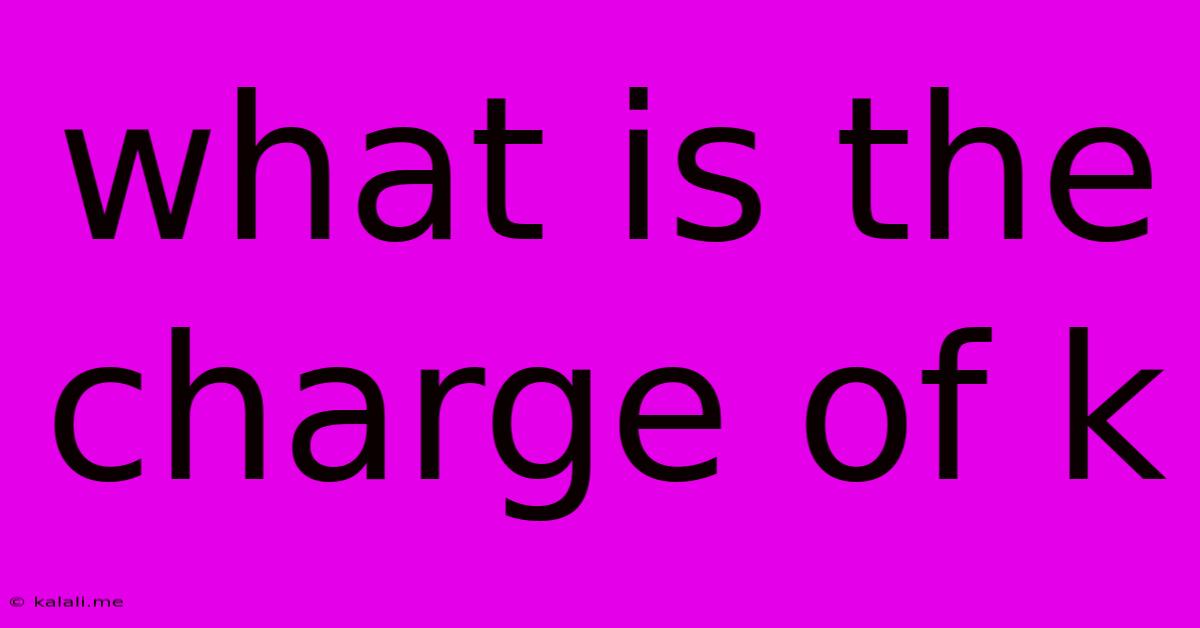What Is The Charge Of K
Kalali
May 09, 2025 · 3 min read

Table of Contents
What is the Charge of K? Understanding Potassium Ions
The question "What is the charge of K?" refers to the charge of potassium ions, a crucial element in biological systems and various chemical reactions. Potassium (K), in its elemental form, is a neutral atom. However, it readily loses one electron to achieve a stable electron configuration, resulting in a positively charged ion. This article delves into the details of potassium's charge, its importance in different contexts, and related concepts.
Understanding Ionic Charge: Atoms are electrically neutral, possessing an equal number of protons (positive charge) and electrons (negative charge). Ions, however, are formed when an atom gains or loses electrons. When an atom loses electrons, it becomes a positively charged ion, or cation. When it gains electrons, it becomes a negatively charged ion, or anion.
Potassium's Electronic Configuration and Ionization: Potassium has an atomic number of 19, meaning it has 19 protons and 19 electrons in its neutral state. Its electron configuration is [Ar] 4s¹. The single electron in the outermost 4s orbital is relatively loosely held. To achieve a stable, filled outer electron shell (like the noble gas Argon), potassium readily loses this single electron. This process is called ionization.
The Charge of K⁺: The loss of one electron leaves potassium with 19 protons and 18 electrons, resulting in a net positive charge of +1. Therefore, the charge of K, when it exists as an ion, is +1, and it's represented as K⁺.
Importance of Potassium Ions (K⁺): Potassium ions play vital roles in numerous biological processes:
- Nerve Impulse Transmission: K⁺ ions are crucial for maintaining the resting membrane potential of nerve cells and for the generation and propagation of nerve impulses. The movement of K⁺ ions across cell membranes is essential for signal transmission throughout the nervous system.
- Muscle Contraction: Similar to nerve impulse transmission, K⁺ ions are involved in muscle contraction. The proper balance of K⁺ ions inside and outside muscle cells is necessary for muscle function.
- Maintaining Fluid Balance: K⁺ ions contribute to the regulation of fluid balance within the body. They help to maintain the proper osmotic pressure and electrolyte balance in cells and bodily fluids.
- Enzyme Activity: Potassium ions act as cofactors or activators for various enzymes, influencing their activity and function within cells.
- Plant Growth and Physiology: Potassium is an essential macronutrient for plant growth. K⁺ ions are involved in numerous plant physiological processes, including stomatal regulation, photosynthesis, and enzyme activation.
Related Concepts:
- Electrolytes: Potassium ions are an important electrolyte, contributing to the overall electrical conductivity of bodily fluids.
- Electrochemical Gradient: The difference in concentration and charge of K⁺ ions across cell membranes creates an electrochemical gradient, which is crucial for various cellular processes.
- Ionic Compounds: Potassium ions readily form ionic compounds with negatively charged ions, such as chloride (Cl⁻) in potassium chloride (KCl).
In conclusion, while potassium (K) in its elemental form is neutral, it commonly exists as a +1 charged ion (K⁺) due to its tendency to lose one electron to achieve a stable electron configuration. This positively charged ion is essential for a wide range of biological processes and chemical reactions. Understanding the charge of K⁺ is crucial for comprehending its role in various fields, from biology and chemistry to agriculture and medicine.
Latest Posts
Related Post
Thank you for visiting our website which covers about What Is The Charge Of K . We hope the information provided has been useful to you. Feel free to contact us if you have any questions or need further assistance. See you next time and don't miss to bookmark.